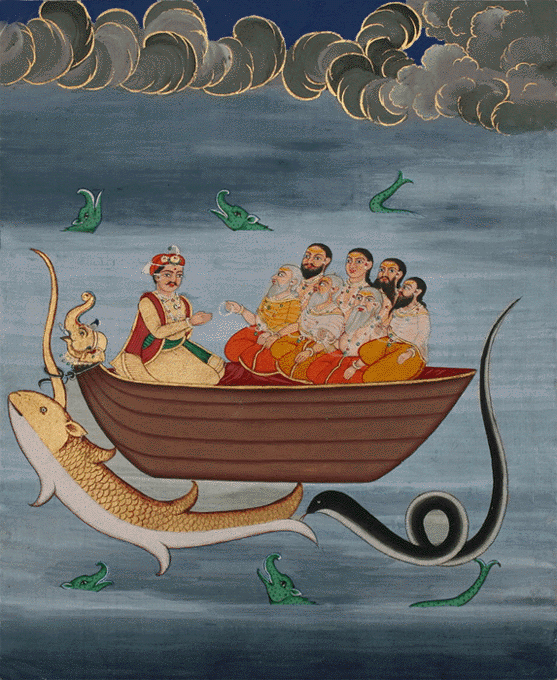
|
|
|
|
BY: SUN STAFF

Lord Matsya with Manu and the Seven Rishis Jul 15, 2012 — INDIA (SUN) — The Saptarishi are the seven rishis who are extolled throughout the Vedas. While the Samhitas never actually enumerate these rishis by name, later Vedic texts such as the Brahmanas and Upanisads do so. The Saptarishi are regarded as the patriarchs of the Vedic religion.
The earliest known list of the Seven Rishis was given by the Jaiminiya Brahmana (2.218-221), as follows: Vasistha, Bharadvaja, Jamadagni, Gotama, Atri, Visvamitra, and Agastya. This list was followed by a slightly different list in Brihadaranyaka Upanisad (2.2.6): Gotama and Bharadvaja, Visvamitra and Jamadagni, Vasistha and Kasyapa, and Atri. The later Gopatha Brahmana (1.2.8) lists Vasistha, Visvamitra, Jamadagni, Gotama, Bharadvaja, Gungu, Agastya, and Kasyapa.
In post-Vedic texts, various different lists appear. The exact list of Saptarshis are not perfectly known, as it is supposed that the astral links to the hierarchy were lost in medieval India due to the debilitating effects of Kaliyuga.
Some of the rishis were recognized as the mind-born sons of Lord Brahma, the representation of the Supreme Being as Creator. Other representations are Mahesha or Shiva as the Destroyer and Vishnu as the Preserver. Since the seven rishis were also among the primary eight rishis, who were considered to be the ancestors of the Gotras of Brahmins, the birth of these rishis was famous throughout the three worlds. Many of the rishis listed below are the ancestors of the Gotras.
Names of the Saptarshis
In post-Vedic religion, a manvantara is the period of astronomical time within an aeon or Kalpa, a "day of Brahma", like the present ?veta Varaha Kalpa, where 14 Manvantaras assist in the creation of one Kalpa.
Each Manvantara is ruled by a specific Manu, and the Vishnu Purana mentions up to the seventh Manvantara:
First Manvantara - the interval of Swayambhu Manu
Marichi, Atri, Angiras, Pulaha, Kratu, Pulastya, and Vashishtha [1][2].
Second Manvantara - the interval of Swarochisha Manu
Urja, Stambha, Pra?a, Dattoli, Rishabha, Nischara, and Arvarivat.
Third Manvantara - the interval of Auttami Manu
The sons of Vashishtha: Kaukundihi, Kurundi, Dalaya, Sankha, Pravahita, Mita,
Fourth Manvantara - the interval of Tamasa Manu
Jyotirdhama, Prithu, Kavya, Chaitra, Agni, Vanaka, and Pivara.
Fifth Manvantara - the interval of Raivata Manu
Hirannyaroma, Vedasri, Urddhabahu, Vedabahu, Sudhaman, Parjanya, and
Sixth Manvantara - the interval of Chakshusha Manu
Sumedhas, Virajas, Havishmat, Uttama, Madhu, Abhinaman, and Sahishnnu.
The present, seventh Manvantara - the interval of Vaivasvata Manu
Kashyapa, Atri, Vashishtha, Vishvamitra, Gautama, Jamadagni,
Bharadvaja [2]. In Vedic astronomy, the seven stars of the Saptarshi Mandal, known as the Big Dipper or Ursa Major, are named as follows:

Vasishtha is accompanied by his wife, the faint companion star Arundhati (Alcor/80 Ursa Majoris). The Saptarshi in Kumara-sambhava The Kumara-sambhava is one among the five Mahakavyas written by the famous poet, Kalidasa. The kavya is about the birth of the war god, Subramanya (Muruga). The Saptarshi play a very important role in the sixth canto of Kumara-sambhava, and their greatness is extolled in the Paramesvaraprabhava. References:
1 (a, b) Account of the several Manus and Manwantaras, Vishnu Purana, translated by Horace Hayman Wilson, 1840, Book III: Chapter I. p. 259, The first Manu was Swayambhuva, then came Swarochisha, then Auttami, then Tamasa, then Raivata, then Chakshusha. These six Manus have passed away. The Manu who presides over the seventh Manwantara, which is the present period, is Vaivaswata, the son of the sun.
| |